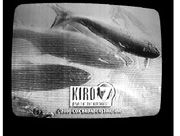ON THURSDAY, SEPTEMBER 28, KIRO-TV aired a half-hour prime-time program entitled “Saving the Salmon.” It looked like a public-interest documentary, examining efforts by the timber industry and community groups to improve salmon habitat. Though the KIRO logo was prominently displayed, nowhere was there a disclosure that the program was not, in fact, an independent production of KIRO, but was bought and paid for by the timber industry.
The only hint that something was amiss—beyond the strangely biased content of the program itself—was one brief announcement at the beginning that said: “The following program was produced in cooperation with the Washington Forest Protection Association.”
You’d have to be some kind of activist wonk to know that the WFPA is actually a timber-funded trade group whose mission, in part, is to head off tough salmon protection legislation. But at least one activist wonk was tuned in: Becky Kelley of the Washington Environmental Council.
“It’s shameful for KIRO and the timber industry to make an advertisement look like some kind of news program,” says Kelley. Her organization opposed a salmon protection bill that got passed in Olympia last year, which established new timber-cutting rules, but which Kelley and others believe did not go nearly far enough to actually save the fish. The Washington Environmental Council has filed suit against the federal government for signing off on this plan, while the timber industry has been aggressively touting it with full-page ads in local newspapers, on its Web site (forestsandfish.com), and on the KIRO program.
The TV show completely avoided questions about the adequacy of last year’s legislation—or, for that matter, any other political debates surrounding salmon recovery, such as restrictions on urban development or the proposed breaching of Snake River dams. It did, however, include plenty of self-serving quotes from Weyerhaeuser’s director of regulatory affairs (“We’re committed to a robust management program. . . .”) and praise for the timber industry’s new, more enlightened forestry practices from officials with the state’s Department of Natural Resources.
The program was interrupted by regular commercials and loads of promotional spots for KIRO’s news and entertainment shows, as well as two public service-seeming advertisements about ways that ordinary people could save the salmon. Those ads encouraged viewers to go to forestsandfish.com for more information and ended with an announcer saying: “Brought to you by the Washington Forest Protection Association in partnership with KIRO . . . in the spirit of the Northwest!” These same spots have run at other times on KIRO.
THE PRODUCER OF “Saving the Salmon,” Pat Wisk of KIRO, did not return calls from Seattle Weekly. But Becky Kelley called him after the show aired. She says Wisk told her that the timber trade group has a contract with KIRO for commercials and programming, both the half-hour and 30-second segments, and that he works for a department within KIRO that produces ads, separate from the news department.
But that doesn’t seem to have been the impression of some of those involved in the program. An e-mail from state Department of Natural Resources official Catherine Elliott that was sent out at the time the program was being put together says: “Our South Puget Sound staff will take KIRO reporter Pat Wisk on a . . . tour [to discuss forest practices] . . . The news segment will be part of KIRO’s follow-up documentary on forests and fish to be aired September 29.”
According to Kelley, KIRO’s Wisk said he was “in the difficult position of producing something and not having any control over the content.” But Cindy Mitchell of the Washington Forest Protection Association also denies having determined the story. “We didn’t have any editorial control over the program,” says Mitchell. “Pat set the tone; we didn’t see the content until it aired.”
Mitchell says she isn’t sure whether to describe the program and the short announcements as PSAs, commercials, or something else. “I don’t know the difference. We sponsored the entire package. We are in a partnership with KIRO. It was a big risk for us to get in an arrangement with them last year. We were told that we didn’t have any control over editorial content. We’re proud of what we’re doing, we’re not hiding anything. We’re making changes on the ground, and we wanted people to know that.”
Kelley is, of course, concerned with the message, but the presentation of the program itself raises issues concerning the distinction between a station that viewers look to for news and information, and a station that sells its air time as a revenue source. One of the benefits the WPFA receives when it pays for its partnership with KIRO is the legitimacy of having the KIRO-TV logo displayed at the end of an industry-funded program. Is another benefit the absence of any critical examination of the timber industry’s role in salmon recovery?
Kelley thinks so, and she notes that no environmentalists or scientists were interviewed in Wisk’s program. She’d like an opportunity to reply, and rhetorically asks, “How much do I have to pay to get ‘the Spirit of the Northwest’ with my message?”
“Saving the Salmon” is scheduled to air again on KIRO-TV at 2:30pm on Sunday, November 12.




